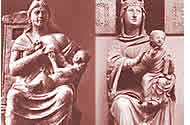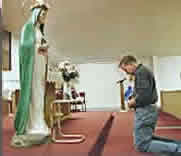 1
|
 Different.
Christian ideas, rituals, sacraments and
myths are different from pagan ideas, rituals,
sacraments and myths. Christian baptism is different from pagan
baptism. The Christian eucharist is different from the Pagan Eucharists.
Christian life after death is different from Pagan life after
death. Different.
Christian ideas, rituals, sacraments and
myths are different from pagan ideas, rituals,
sacraments and myths. Christian baptism is different from pagan
baptism. The Christian eucharist is different from the Pagan Eucharists.
Christian life after death is different from Pagan life after
death.
Of course you can't say Christian baptism and
Pagan baptism are different without saying they're
similar. They are both baptisms, after all. (Believing
scholars who hold out for Different often insist on something
like "baptism and purificatory water initiations,"—because
they see "baptism and baptism" concedes the point. This
doesn't fool anyone who doesn't want to be fooled.)
 And
once you've conceded they are both baptisms or "purificatory
water initiations", all you can really say is
Christian baptism or [your sacrament here] is qualitatively
different from Pagan baptism or [your sacrament here].
More elevated, more spiritual, believing scholars often suggest.
I've even seen, "more sublime." Whatever; they're all
roundabout ways of saying the Pagan sacrament isn't but the Christian
sacrament is "true," and "valid." And
once you've conceded they are both baptisms or "purificatory
water initiations", all you can really say is
Christian baptism or [your sacrament here] is qualitatively
different from Pagan baptism or [your sacrament here].
More elevated, more spiritual, believing scholars often suggest.
I've even seen, "more sublime." Whatever; they're all
roundabout ways of saying the Pagan sacrament isn't but the Christian
sacrament is "true," and "valid."
And that isn't critical scholarship, that's theology.
Fine; we can still be friends.
 |
 2
|
 Not
different, but it developed separately. Christian ideas,
rituals, sacraments and myths are similar to Pagan ideas, rituals,
sacraments and myths, but they developed separately. Believing
scholars often say, "in parallel." What "in parallel"
is taken to mean is, "independently," or "uninfluenced
by." Not
different, but it developed separately. Christian ideas,
rituals, sacraments and myths are similar to Pagan ideas, rituals,
sacraments and myths, but they developed separately. Believing
scholars often say, "in parallel." What "in parallel"
is taken to mean is, "independently," or "uninfluenced
by."
"In parallel" is a sneaky phrase for believing scholars
to use, because it doesn't just mean "independently,"
it also means "at the same time." But it doesn't come
right out and say so. That helps the believing scholars' argumentationing,
because at the same time would be good if it were true—but
it's not. Paganism was around for thousands of years before Christianity.
So were the Pagan ideas, rituals, sacraments and myths. What developed
separately really means is "developed
forty-seventh, but uninfluenced by."
I can't honestly see how it's possible to invent something you
already know about. If you know about the soul surviving death,
you know about the soul surviving death. And if you know
about it, you can't come up with it on your own. If you
know about water baptism, you know about water baptism. And if
you know about it, you can't come up with it on your own.
How you can develop an idea on your own that everyone else in the
culture, including you before you converted, knows about—that's
a detail the believing scholars don't dwell on. They're busy doing
other stuff, I guess.
In parallel isn't critical scholarship. It's not even reasoned
theology. In parallel is wishful thinking in defense of
belief. Fine; we can still be friends.
 |
 3
|
Not
different, but it developed first. Christian ideas, rituals,
sacraments and myths are similar to Pagan ideas, rituals, sacraments
and myths, but they developed first. Them varmint Pagans
done stole from us! Backwards in time even—that's
the explanation the early Church fathers gave. They called it
"demonic imitation."
Developed first?—the facts say different,
as the early Christians' backwards-in-time demonic imitation shows.
Developed first isn't critical scholarship. It's not even reasoned
theology. Developed first is wishful thinking in defense
of belief. Fine; we can still be friends.
 |

 .T
.T

 And
once you've conceded they are both baptisms or "purificatory
water initiations", all you can really say is
Christian baptism or [your sacrament here] is qualitatively
different from Pagan baptism or [your sacrament here].
More elevated, more spiritual, believing scholars often suggest.
I've even seen, "more sublime." Whatever; they're all
roundabout ways of saying the Pagan sacrament isn't but the Christian
sacrament is "true," and "valid."
And
once you've conceded they are both baptisms or "purificatory
water initiations", all you can really say is
Christian baptism or [your sacrament here] is qualitatively
different from Pagan baptism or [your sacrament here].
More elevated, more spiritual, believing scholars often suggest.
I've even seen, "more sublime." Whatever; they're all
roundabout ways of saying the Pagan sacrament isn't but the Christian
sacrament is "true," and "valid."
